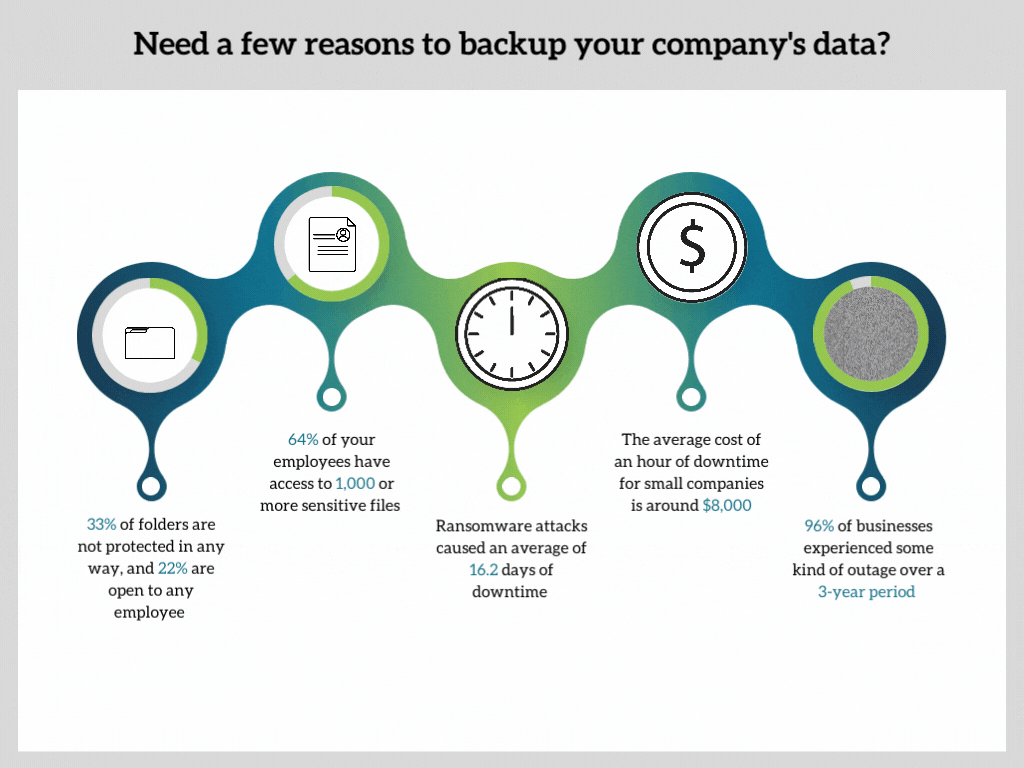
Failing to back up your work could cost your business everything, and it’s very likely your team could use some tune-ups in the security department. If you’re concerned that you may be under-prepared for a potential attack and want to ensure your backups are secure, there are three easy questions to ask your team about your data backups:
- What kind of backups should you be using?
- How often should you backup your data?
- Where should these backups be stored?
Remember high school? Sure you do, it was your favorite (or least favorite) time of your life, back when you met the person who’s still your best friend today – and when you memorized the same part from Hamlet that Adam Sandler does in Billy Madison and receive a surprising B+ on your English Lit midterm. Or, like, whatever it was you were up to.
Anyway, all nostalgia aside, if you grew up learning to word process on a personal computer, the term “save early, save often” was very likely drilled into your head by your English teacher, library assistant, or whoever else was teaching you about writing a research paper.
And they had a great point! Computers and technology are fantastic tools for us, but if we aren’t taking the time to back up our work, a random glitch or keystroke mistake could spell doom for not just your work, but the entire computer itself.
A recent report from McAfee cites global losses from cybercrime impacting businesses to the tune of $1 trillion in 2020, with that number skyrocketing drastically in the past year to upwards of $6 trillion according to Intrusion – and that number is still rising.
Thanks to a major push to remote work spurred on by the COVID-19 pandemic, cybercrime escalated as many businesses moved their people to work remotely, which opened up more potential points of attack on unaware – and unprepared – businesses.
To segue into today’s important topic, backing up your data has never been more important. Not even when you were writing your capstone essay – that was a letter grade, but this is significantly higher stakes, including potentially millions of dollars in lost revenue and productivity.
{{cta(‘8ebfe3cf-a624-4bba-8692-99461feb9a71′,’justifycenter’)}}
What kind of backups should I be using to keep my business safe?
Today’s industry standard for backing up large amounts of data is an image-based backup, though file-based backups haven’t gone away entirely. If you’re still a little lost, don’t fret – the difference isn’t too complex or tech-heavy!
Breaking it down simply-
- Image-based backups take a “snapshot” of your computer (or “machine”) at the point in time you ask it to. This snapshot captures the Operating System, all of the installed programs, software updates, and files across the machine. So when something goes wrong with your computer, your team can access the last backup image to effectively time travel back to a time before the hiccup.
- File-based backups recover the same data accessed by the image-based snapshot but instead pull from a file-level backup that requires you manually reinstalling the Operating System, drivers, updates, software, recreating any shares, and reconfiguring previous settings. Only then can you restore the files back to their location – and you can see why it’s being phased out.
File-level backups are often more cost-effective upfront – but you always get what you pay for with tech security solutions. For starters, the difference in recovery time between these options is dramatic. Image-based backups can get you working again relatively quickly given the situation, but file-level backups always take much, much longer to reboot. File-level backups are definitely better than nothing, but image-based backups are the better choice every time.
Then there is the convenience-based cloud backup that is directly competing with physical backups. While there is no right or wrong answer to this question (it depends on your business), we prefer the convenience of cloud storage and backups. Cloud-based options are not necessarily the best solution for every company, especially if you have an unreliable internet connection or have to meet regulations that require physical backups. Discuss your concerns with your favorite IT company *ahem* to figure out what is right for you.
How often should I backup my company’s data?
So you’ve figured out how your team wants to save your data, that’s fantastic!
… Now what?
Regularly backing up your files could mean anything to any business – so is that daily, weekly, monthly, or some kind of in-between??
Well just like in English class, you should save early and save often. To determine how often you should be backing up your network, consider the amount of work or information you could realistically afford to lose in the event of a disaster or breach, and that’s how often you should be backing up your network – at a minimum.
Think about it this way: If you lost every single bit of last week’s information from your company with the snap of a finger, would it be a problem? If the answer is “of course it would be, are you insane?” then you should be considering a daily save of your work. If you can’t go even a few hours without catastrophe, make it more frequent.
Additionally, your team doesn’t necessarily need to back up the entirety of its data every single time ‘save’ is clicked. You can also use a combination of full backups and incremental backups which entire system at certain intervals, like once a week (typically a weekend), with incremental back-ups at night to catch and back up the information entered that day.
Where should my backups be stored for safekeeping?
The most commonly overlooked element to properly maintaining backups is where to store these essential items.
Where is your system being backed up to? Is it on the same network as your working files? Or is it going to an off-site location (whether this is through the Cloud or taking a physical backup to an off-site location like a safety deposit box)?
Having backups on your network or on a hard drive in your office is fine for more straightforward situations like files being accidentally deleted. But when true real disaster strikes, the only way to ensure you can get your team up and running again is to have backups secure in an off-site location.
For example, if your office is burglarized and your equipment is stolen, how are you going to start working again from a physical in-house backup? Or, in another common scenario, what happens when someone connected to your network receives ransomware and your whole network gets encrypted?
With an off-site backup solution, all you would need to do is notify your vendor of the problem and they will send a hard drive with the latest backups so that once the hardware and consoles that were stolen or encrypted are replaced, your team can restore a backup and get back to work in a matter of moments.
Conclusion
The importance of a reliable and robust backup strategy is not to be underestimated in today’s volatile marketplace, especially when it comes to security. Firewalls, anti-malware and antivirus programs, and other preventative solutions are essential to any data security plan, but the reality is, even the best solutions won’t stop mistakes from happening.
As nice as it would be, a firewall isn’t going to stop a tornado from destroying your office, so back up your files frequently and keep them in a VERY safe place!
For more information on security topics like backups check out our other blogs or give us a call at (864) 552-1291, and we’ll help you evaluate capabilities and options. For more information on tech topics like hybrid meetings, sign up for PTG Tech Talk and follow us on LinkedIn, Facebook, and Twitter!

